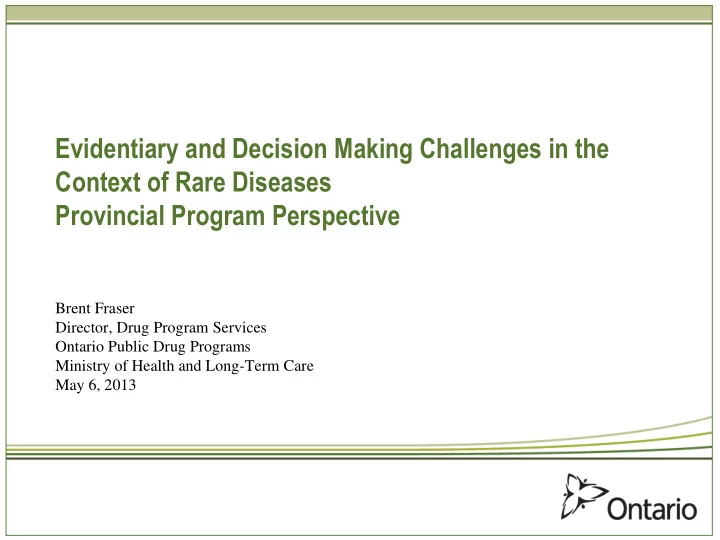

Evidentiary and Decision Making Challenges in the Context of Rare Diseases Provincial Program Perspective Brent Fraser Director, Drug Program Services Ontario Public Drug Programs Ministry of Health and Long-Term Care May 6, 2013
Background • Drugs for rare diseases (DRDs) are often unable to meet traditional benchmarks of efficacy and cost-effectiveness. There is a large gap between information available on DRDs and the evidence customarily required to approve drugs for public funding. Historically, funding recommendations from expert advisory committees were often negative. • In December 2007, Ontario established a working group comprised of clinical experts and health economists to develop an evaluation framework to review DRDs. The draft framework was completed in late 2008/early 2009, with Elaprase for Hunter’s Syndrome (MPS II) being the first drug to be evaluated through the framework. • Ontario’s DRD Evaluation Framework uses tools to aggregate the best available evidence on the disease and the treatment. This information is then used to predict the potential benefit or lack of benefit of the drug in terms of slowing disease progression and/or reversing the effects of the disease. 2
Background • Ontario DRD Framework Overview • Evidence-based evaluation process • Considers best achievable evidence Will consider indirect evidence Evidence used for regulatory approval typically differs from what payors require • Use predictive models to inform funding by identifying: Natural progression of a disease Where a drug may provide treatment effect Patients who are most likely to benefit from treatment • Cost-effectiveness is not considered • A separate advisory committee DRD Working Group 5 members, including past and current CED members (2 physicians, 1 economist, 1 pharmacist) and a geneticist Direct report to the Executive Officer 3
Ontario’s DRD Evaluation Framework • Types of drugs/diseases considered through DRD Evaluation Framework: • All diseases, including rare cancers, can be considered through the DRD Evaluation Framework. Not restricted to genetic or metabolic diseases. • Requests for review through the DRD Evaluation Framework are accepted from: • Manufacturers and/or clinicians • Must provide essential clinical data on the drug and the disease, including detailed information on the natural history of the disease • Information on the submission process: http://www.health.gov.on.ca/english/providers/program/drugs/how_drugs_app rov/review_rare_diseases.html • The ministry, in consultation with members of the DRD Working Group, will determine whether a drug meets the criteria to be considered for review through the DRD Evaluation Framework. 4
Drugs Evaluation via DRD Evaluation Framework Completed: • Elaprase (idursulfase) for Hunter Syndrome (mucopolysaccharidosis, MPS II) • Myozyme (alglucosidase) for Adult Pompe Disease • Zavesca (miglustat) for the treatment of Niemann Pick, Type C (NPC) • Aldurazyme (laronidase) for the treatment of MPS I • Zolinza (vorinostat) for the treatment of Cutaneous T-Cell Lymphoma (CTCL) • Naglazyme (galsulfase) for the treatment of Maroteaux-Lamy Syndrome (MPS VI) Ongoing: • Ilaris (canakinumab) for the treatment of cryopyrin-associated periodic syndrome (CAPS) 5
Experience To-Date Accomplishments • Seven drugs have been reviewed through the framework. • Disease models and/or reimbursement criteria have been completed for four of the seven drugs. • Re-evaluations have been conducted on two drugs to determine whether updates to the reimbursement criteria are needed in light of new clinical evidence. (Periodic re- evaluations are done to assess whether changes to funding are required based on the most up-to-date clinical data.) Challenges • Reviews are exhaustive. Extensive time is required to perform a comprehensive work- up of the disease and the drug and to develop a predictive disease model. Timelines for DRD reviews tend to be longer than with regular drug reviews. • For two of the drug reviews, we were unable to proceed with the evaluation because there were insufficient data on the natural history of the disease. This made it impossible for the working group to provide an evidence-based assessment of whether, and under which circumstances, the drug will provide benefit. This is particularly problematic in ultra rare diseases. We will be examining whether there are alternative approaches that can be used for these cases. 6
Where Do We Go From Here • Province and Territories working with CADTH to identify opportunities to align DRD reviews with national process versus creating a separate process • Need to consider the following: • Recommendations: recognizing the concerns with cost-effectiveness, should a different type of recommendation be considered for DRD reviews? • How do we identify DRD drugs? Different jurisdictions using different definitions for different purposes. What is the impact of Health Canada’s Orphan Drug framework? When should products go through a DRD framework versus established review processes? • What additional processes are required to support DRD reviews? • Should willingness to pay be considered in this context? If so, how? How do we account for ability to pay? 7
Recommend
More recommend